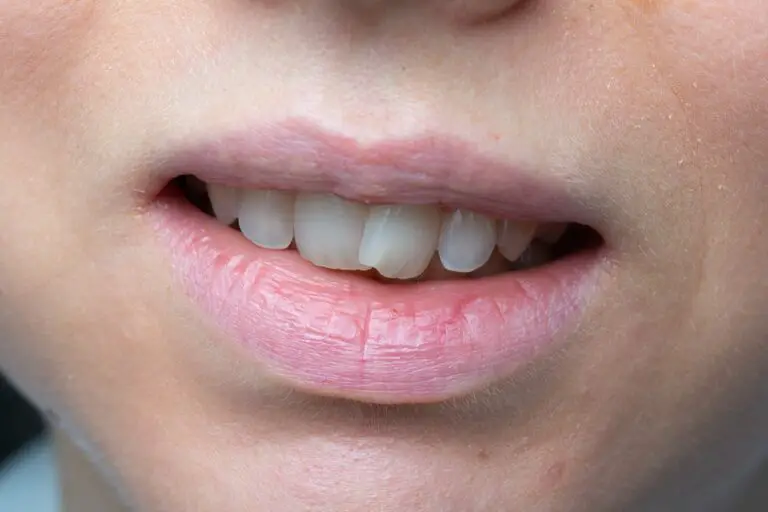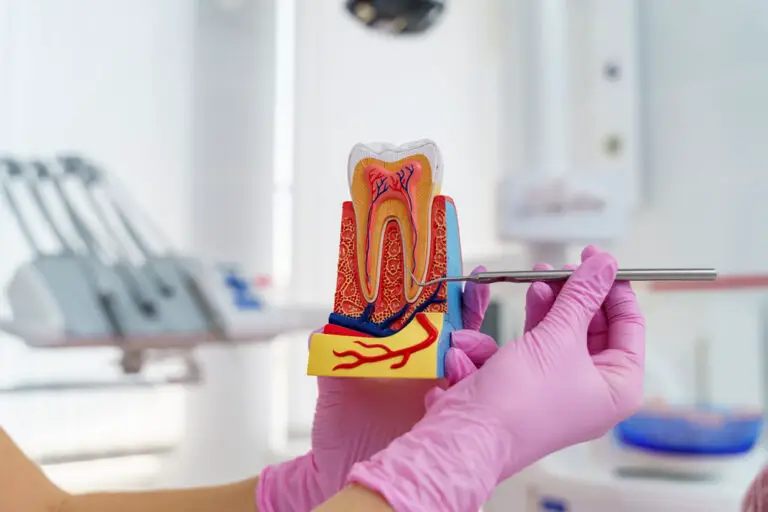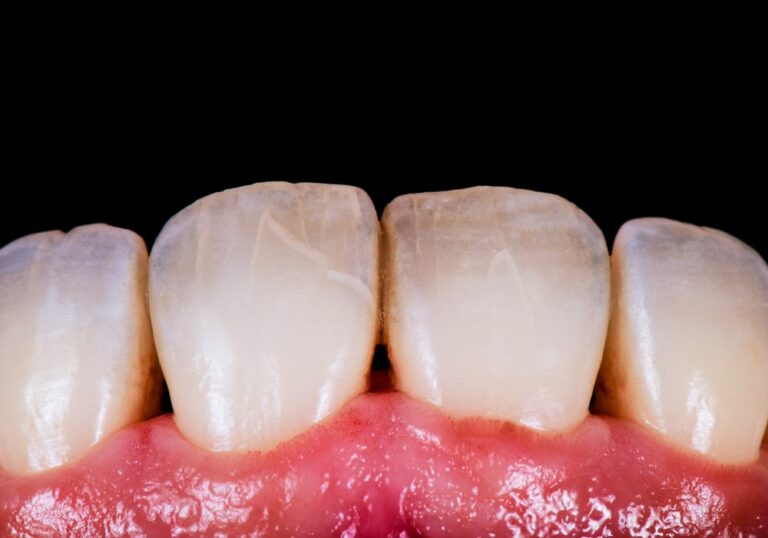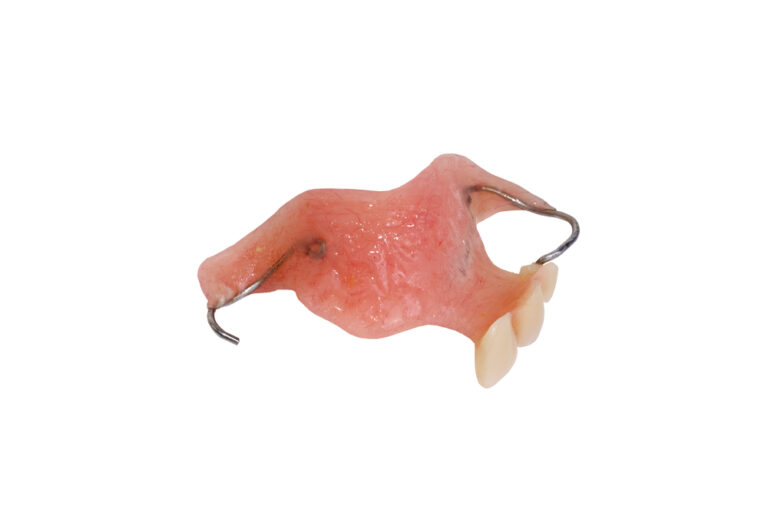Black teeth near the gums can be a concerning issue for many people. While tooth discoloration is a common problem, black teeth can be particularly distressing. There are several potential causes for black teeth near the gums, ranging from lifestyle choices to underlying medical conditions.
Understanding the causes of black teeth near the gums is the first step to addressing the issue. Intrinsic causes, such as decay or cavities, can lead to black teeth. Extrinsic causes, such as staining from food and drink, can also contribute to tooth discoloration. Additionally, gum disease can cause black teeth by damaging the gums and teeth roots.
Key Takeaways
- Black teeth near the gums can be caused by intrinsic or extrinsic factors, as well as gum disease.
- Lifestyle choices, such as smoking and poor dental hygiene, can contribute to tooth discoloration.
- Preventative measures, such as regular dental checkups and proper oral hygiene, can help prevent black teeth near the gums.
Understanding Tooth Discoloration
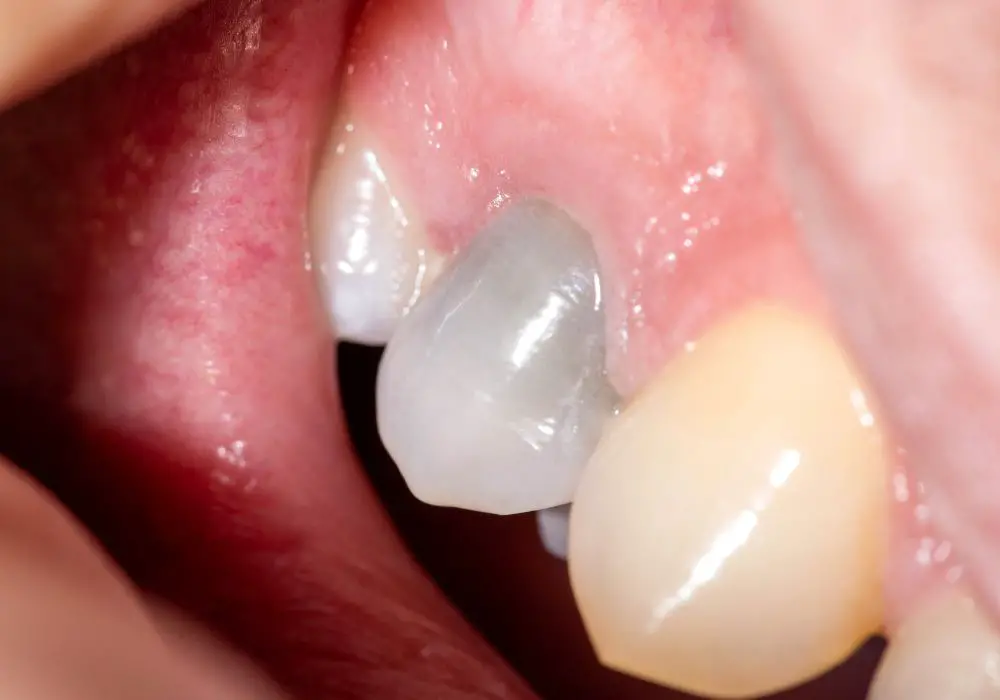
Tooth discoloration is a common dental problem that affects people of all ages. It is the process of changing the color of your teeth from white to yellow, brown, or black. There are many reasons why teeth can become discolored, including poor oral hygiene, aging, genetics, and lifestyle factors such as smoking and consuming certain foods and drinks.
Tooth discoloration can be classified into two types: extrinsic and intrinsic. Extrinsic discoloration occurs when the outer layer of the tooth, called the enamel, becomes stained due to exposure to external factors such as tobacco, coffee, tea, wine, and certain medications. Intrinsic discoloration occurs when the inner structure of the tooth, called the dentin, darkens or gets a yellowish tint. This can be caused by factors such as trauma, infection, medication, or excessive fluoride consumption.
It is important to note that not all tooth discoloration is caused by external factors. Some people may have naturally darker teeth due to genetics or certain medical conditions. In addition, poor oral hygiene can lead to the buildup of plaque and tartar, which can cause teeth to appear yellow or brown.
If you are experiencing tooth discoloration, it is important to consult with your dentist to determine the underlying cause and the best treatment options. Depending on the cause and severity of the discoloration, treatment options may include professional teeth whitening, bonding, veneers, or in severe cases, crowns or implants.
In summary, tooth discoloration is a common dental problem that can be caused by a variety of factors. Understanding the different types of discoloration and their causes can help you take steps to prevent and treat this issue.
Causes of Black Teeth
Black teeth can be caused by a variety of factors, both extrinsic and intrinsic. Extrinsic causes of black teeth come from the outside of the teeth and include staining and tartar buildup. Intrinsic causes of black teeth come from the inside of the teeth and can be caused by decay, cavities, or other dental issues.
One common cause of black teeth is poor oral hygiene. Failing to brush and floss regularly can lead to the buildup of plaque and tartar, which can cause teeth to turn black. Other lifestyle factors, such as smoking or consuming dark-colored foods and beverages, can also contribute to black teeth.
In some cases, black teeth may be caused by underlying dental issues. For example, a tooth that has suffered trauma or has a dead nerve may turn black. Additionally, certain medications and medical conditions can also cause teeth to turn black.
If you are experiencing black teeth, it is important to visit your dentist to determine the underlying cause and receive appropriate treatment. In some cases, treatment may involve professional cleaning to remove tartar and stains, while in other cases, more extensive dental work may be necessary.
Gum Disease and Black Teeth
Gum disease is a common cause of black teeth near the gums. When bacteria build up on teeth, they can cause inflammation and infection in the gums. This can lead to periodontitis or gingivitis, which can cause teeth to turn black.
Periodontitis
Periodontitis is a severe gum infection that can damage the soft tissue and bone that support teeth. It can cause teeth to loosen or lead to tooth loss. Symptoms of periodontitis may include:
- Bad breath
- Red, swollen, or bleeding gums
- Dark staining on the surface of the teeth
- Loose teeth
- Hard deposits on the teeth
If you suspect that you have periodontitis, it is important to see a dentist or periodontist as soon as possible. Treatment may involve deep cleaning, medication, or surgery.
Gingivitis
Gingivitis is a milder form of gum disease that causes inflammation and irritation in the gums. It can cause teeth to turn black if left untreated. Symptoms of gingivitis may include:
- Red, swollen, or bleeding gums
- Bad breath
- Loose teeth
- Dark staining on the surface of the teeth
Gingivitis can often be treated with good oral hygiene habits, such as brushing and flossing regularly, using mouthwash, and visiting the dentist for cleanings and checkups.
In conclusion, gum disease can be a common cause of black teeth near the gums. If you suspect that you have gum disease, it is important to see a dentist or periodontist as soon as possible to prevent further damage to your teeth and gums.
Effects of Lifestyle Choices
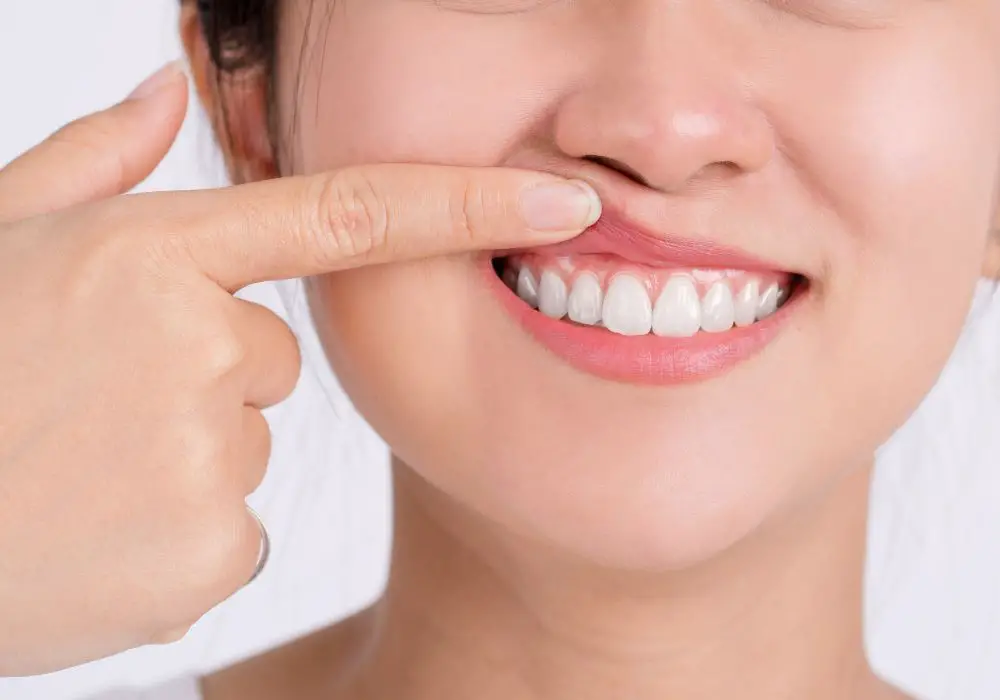
Smoking and Tobacco Use
Smoking and tobacco use are significant contributors to black teeth near the gums. The nicotine and tar in cigarettes can cause severe staining of the teeth, and the chemicals in tobacco products can lead to gum disease, which can cause teeth to turn black. Additionally, smoking can reduce blood flow to the gums, making it harder for the body to fight off infections.
Poor Oral Hygiene
Poor oral hygiene can also contribute to black teeth near the gums. Not brushing and flossing regularly can lead to a buildup of plaque and tartar, which can cause discoloration of the teeth and gum disease. Additionally, not visiting the dentist regularly for cleanings and checkups can lead to more severe dental issues.
Dietary Factors
Certain foods and drinks can also contribute to black teeth near the gums. Dark-colored beverages such as coffee, tea, and soda can cause staining of the teeth, as can red wine. Additionally, consuming sugary and starchy foods can lead to the buildup of plaque and tartar, which can cause discoloration of the teeth and gum disease.
It is essential to practice good oral hygiene and make healthy lifestyle choices to prevent black teeth near the gums. This includes brushing and flossing regularly, visiting the dentist for cleanings and checkups, quitting smoking and tobacco use, and consuming a healthy diet low in sugar and starch.
Medical Conditions and Black Teeth
There are several medical conditions that can cause black teeth, including certain medications and genetic factors.
Certain Medications
Some medications can cause tooth discoloration, including black teeth. The discoloration is often caused by the medication binding to the tooth enamel. Medications that can cause black teeth include:
- Tetracycline antibiotics
- Iron supplements
- Antihistamines
- Antipsychotic medications
- Chemotherapy drugs
If you are taking any of these medications and notice black discoloration on your teeth, talk to your doctor or dentist.
Genetic Factors
In some cases, genetics can play a role in black teeth. Some people are born with darker tooth enamel, which can make teeth appear black or gray. Additionally, some genetic conditions can cause black teeth, including:
- Amelogenesis imperfecta
- Dentinogenesis imperfecta
- Hemochromatosis
If you suspect that your black teeth are caused by a genetic condition, talk to your dentist or doctor. They may recommend genetic testing or refer you to a specialist for further evaluation.
It is important to note that while black teeth can be a sign of a medical condition, they can also be caused by poor oral hygiene, smoking, and consuming certain foods and drinks. If you are concerned about black teeth, talk to your dentist to determine the cause and appropriate treatment.
Possible Dental Procedures
If you notice your teeth turning black near your gums, it’s important to see a dentist as soon as possible. Depending on the cause of the discoloration, your dentist may recommend one or more dental procedures to restore the appearance and health of your teeth.
Professional Cleaning
One of the most common dental procedures for black teeth is professional cleaning. This involves removing plaque, tartar, and other buildup from your teeth and gums to restore their natural color and prevent further discoloration. Your dentist may also recommend regular cleanings to maintain the health of your teeth and gums.
Root Canal Therapy
If the black discoloration is caused by a deep cavity or infection, your dentist may recommend root canal therapy. This involves removing the infected or damaged pulp from your tooth and filling it with a special material to restore its shape and function. This can help prevent further damage and discoloration, and may be necessary to save the tooth.
Dental Veneers
For more severe cases of black teeth, your dentist may recommend dental veneers. These are thin, custom-made shells that are bonded to the front of your teeth to improve their appearance and protect them from further damage. Veneers can be made from porcelain or composite resin, and can last for many years with proper care.
Overall, the best way to prevent black teeth near your gums is to practice good oral hygiene and see your dentist regularly for checkups and cleanings. If you do notice discoloration or other issues with your teeth, be sure to schedule an appointment with your dentist as soon as possible to get the treatment you need.
Prevention Strategies
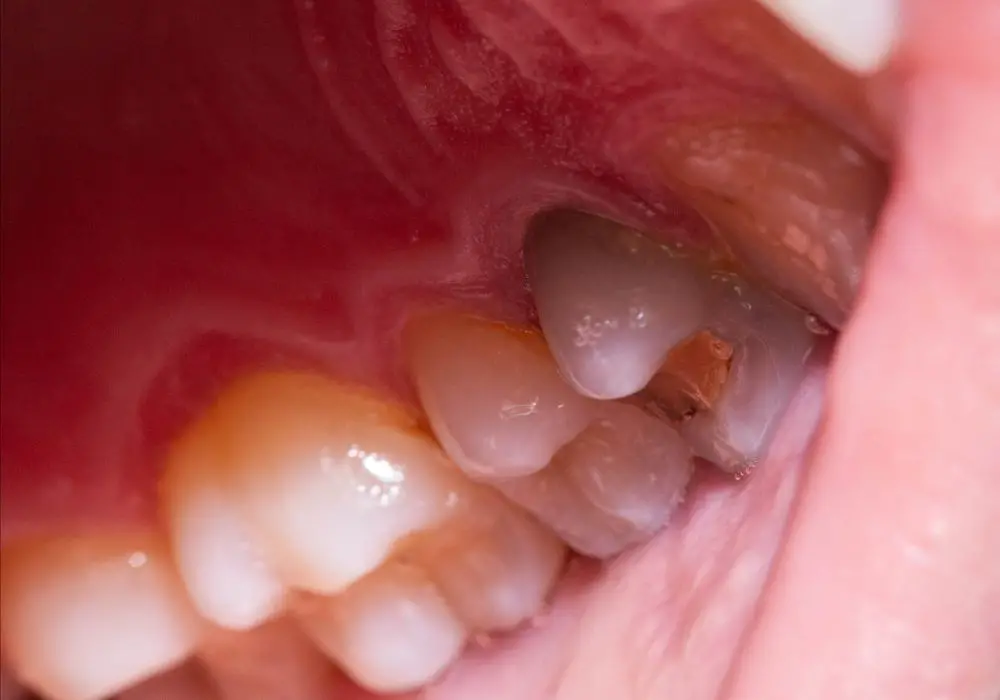
Preventing black teeth near the gums requires a combination of regular dental check-ups and good oral hygiene practices.
Regular Dental Checkups
Regular dental check-ups are essential for maintaining good oral health. During a dental check-up, your dentist will examine your teeth and gums for signs of decay or disease. They can also clean your teeth to remove any plaque or tartar buildup.
It is recommended to visit the dentist every six months for a routine check-up. However, if you have a history of dental problems, your dentist may recommend more frequent visits.
Good Oral Hygiene Practices
Good oral hygiene practices can help prevent black teeth near the gums. Here are some tips:
- Brush your teeth twice a day with a fluoride toothpaste
- Floss daily to remove plaque and food particles from between your teeth
- Use an antiseptic mouthwash to kill bacteria and freshen your breath
- Avoid smoking and using tobacco products
- Limit your intake of sugary and acidic foods and drinks
- Drink plenty of water to help rinse away food particles and bacteria
It is also important to use the correct brushing technique. Hold your toothbrush at a 45-degree angle to your gums and use gentle circular motions to brush the front, back, and top of each tooth.
By following these prevention strategies, you can help maintain good oral health and prevent black teeth near the gums.
Frequently Asked Questions
What causes black tartar on teeth?
Black tartar on teeth is caused by the buildup of plaque and bacteria that hardens over time. This can happen if you don’t brush and floss regularly or if you have poor oral hygiene habits. Smoking and drinking coffee or tea can also contribute to the buildup of black tartar on teeth.
How to get rid of black between teeth?
You can get rid of black between teeth by brushing and flossing regularly. You can also use an interdental brush or water flosser to clean between your teeth. It’s important to visit your dentist regularly for professional cleanings to remove any stubborn black tartar.
Can black tartar be removed?
Yes, black tartar can be removed by a dentist or dental hygienist during a professional cleaning. It’s important to maintain good oral hygiene habits to prevent the buildup of black tartar in the future.
Black tartar vs cavity?
Black tartar is a buildup of plaque and bacteria that hardens over time, while a cavity is a hole in the tooth caused by decay. Both can cause discoloration and damage to the teeth, but they are caused by different factors and require different treatments.
How do you get rid of black teeth at the gum line?
You can get rid of black teeth at the gum line by brushing and flossing regularly, and using an interdental brush or water flosser to clean between your teeth and along the gum line. It’s important to visit your dentist regularly for professional cleanings to remove any stubborn black tartar.
What are the best ways to prevent black tartar from forming on teeth?
The best ways to prevent black tartar from forming on teeth are to brush and floss regularly, avoid smoking and drinking coffee or tea, and visit your dentist regularly for professional cleanings. It’s also important to maintain a healthy diet and lifestyle to support good oral hygiene habits.



